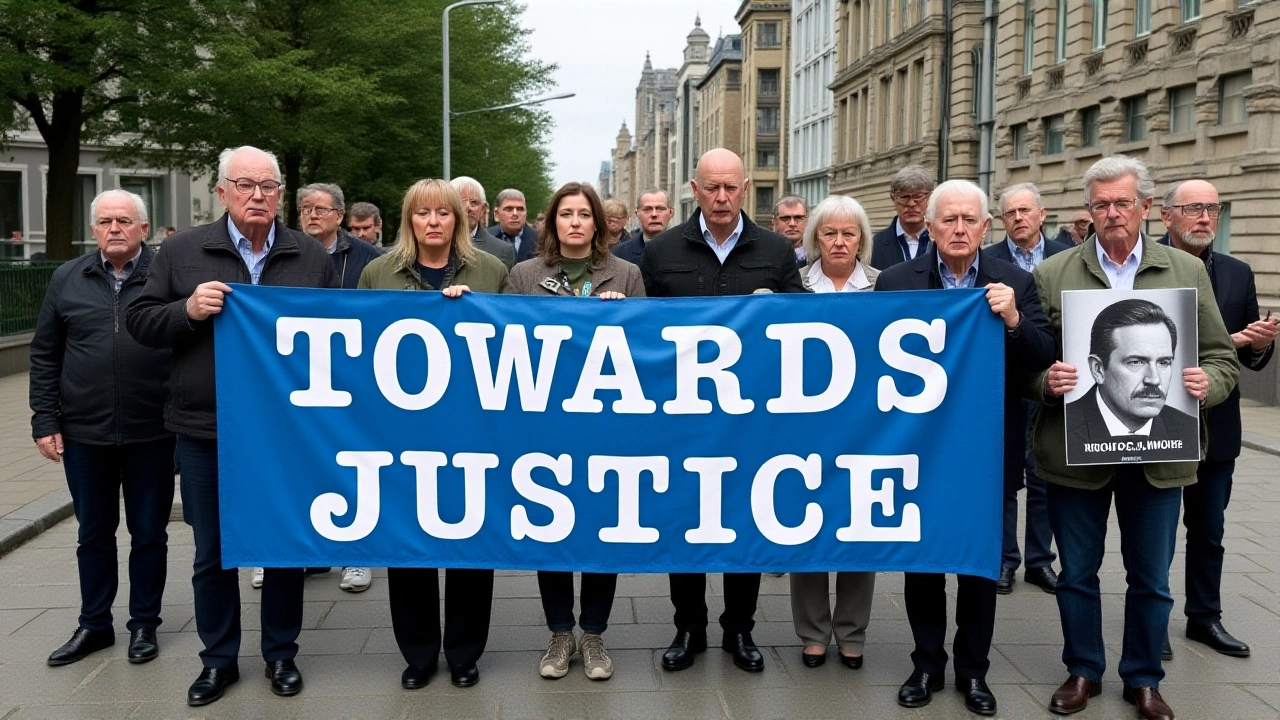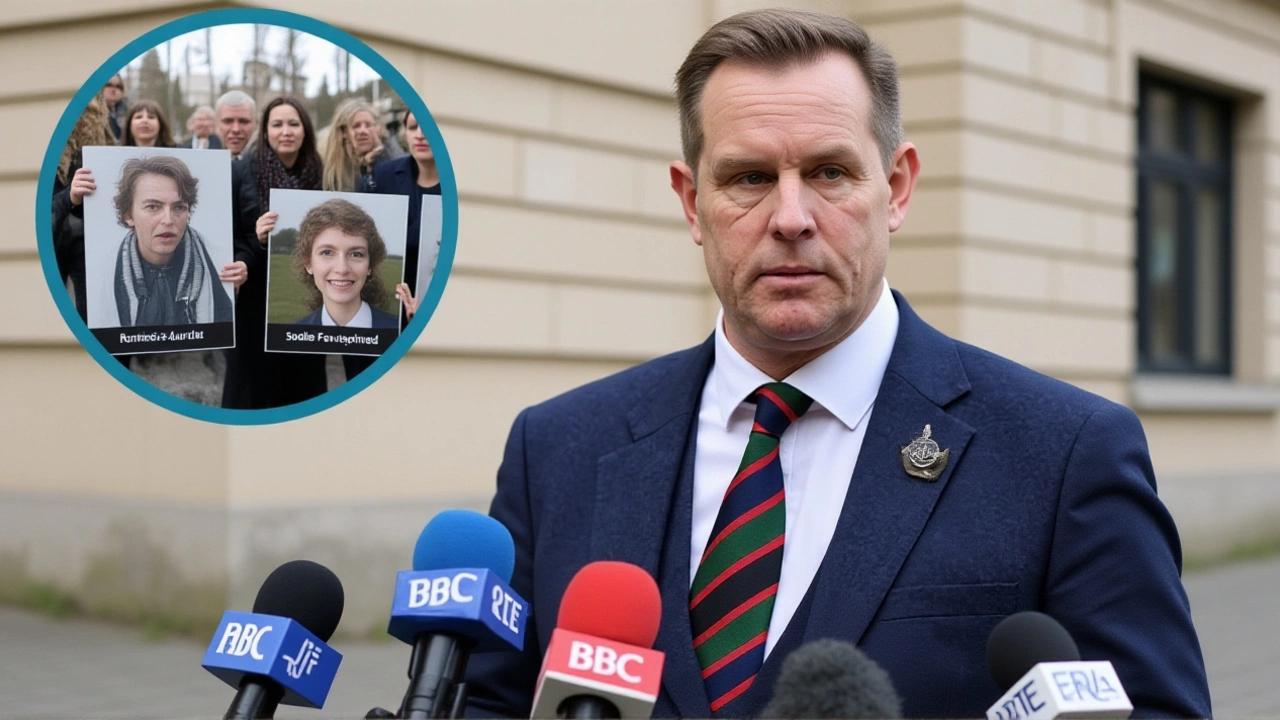When Soldier F, a 78‑year‑old former paratrooper, was found not guilty of murdering two civilians in the Ballymurphy raids, unionist leaders immediately branded the case a political stunt.
The verdict was delivered at Belfast Crown Court on 23 October 2025, ending an eight‑week trial that had cost the Public Prosecution Service for Northern Ireland £2.3 million since the charges were laid in January 2021.
Background to the 1972 Ballymurphy killings
On 9 August 1972, British soldiers from the 1st Battalion, Parachute Regiment swept through the Ballymurphy estate in West Belfast, conducting house‑to‑house searches after an IRA bomb wound three soldiers. In the chaos, 44‑year‑old Francis Quinn and 45‑year‑old Daniel Teggart were shot dead. The incident pre‑dated the more infamous Bloody Sunday by eleven months, yet it has remained a painful flashpoint for nationalist communities.
Investigations were dormant for decades until the 2014 Fresh Start Agreement created the Historical Investigations Unit (HIU) within the Police Service of Northern Ireland. Between 2016 and 2023, the HIU reviewed 1,850 unsolved killings, flagging 23 former soldiers for possible prosecution; only four cases, including Soldier F’s, made it to trial.
The trial of Soldier F
Prosecutor Chris Murphy KC argued that Soldier F opened fire without justification, contradicting the defence’s claim of self‑defence. The defence, led by Paul Duffy KC, suggested the soldiers faced a genuine threat amid a high‑risk operational zone.
Forty‑seven witnesses took the stand, ranging from former soldiers to civilian eyewitnesses. Forensic expert Dr. Angela Gallen of the Defence Science and Technology Laboratory presented ballistics that linked the fatal bullets to Soldier F’s L1A1 rifle, but the defence successfully challenged the chain‑of‑custody for evidence stored at Thiepval Barracks.
After three days of deliberation, the jury returned a unanimous not‑guilty verdict at about 4:15 PM GMT. The judge, Mr. Justice Mark Horner, had previously excluded 12 statements as unreliable because they spanned more than half a century.
Unionist and nationalist reactions
Sir Jeffrey M. Donaldson, DUP leader and MP for Lagan Valley, described the trial as a "politically motivated show trial designed to criminalise the lawful actions of British soldiers who risked their lives to protect communities from IRA terrorism". He made the remarks outside Parliament Buildings at Stormont just after the verdict.
Ulster Unionist Party leader Rt. Hon. Doug Beattie echoed Donaldson’s sentiment, pointing out the £2.3 million spent on the case could have funded victims’ services for the 3,720 unionist civilians killed during the Troubles.
Nationalist voices were no less vocal. Sinn Féin Vice President Michelle O'Neill told RTE that “the families of Francis Quinn and Daniel Teggart have waited 53 years for justice” and stressed that the verdict does not erase the historical fact of British soldiers killing innocent civilians.
Human‑rights solicitor Caoimhe de Barra represented the victims’ families throughout the trial. She noted that the Teggart family received £85,000 in interim damages from the Ministry of Defence in 2019, while the Quinn family was compensated £72,500 under the Historical Institutional Abuse scheme.
Political fallout and legislative response
Within hours of the verdict, Secretary of State for Northern Ireland Chris Heaton‑Harris announced a fast‑tracked amendment: the Historical Prosecutions (Northern Ireland) Bill would introduce a two‑year statute of limitations for any new legacy prosecutions brought after 1 January 2026. The bill, already before the House of Commons, aims to halt 19 pending cases against former soldiers while allowing paramilitary prosecutions under the Legacy Act 2023 to continue.
The Northern Ireland Office confirmed the bill would receive Royal Assent by 15 December 2025, with implementation slated for 1 February 2026. If enacted, it will affect 2,138 outstanding legacy cases managed by the Independent Commission for the Location of Victims’ Remains and the HIU.
PSNI Chief Constable Jonina Valentina, the force’s first female leader, warned that the verdict “creates significant challenges for future legacy investigations requiring evidence from military personnel now in their 70s and 80s.”

Implications for legacy cases and veteran support
The acquittal has already sparked a surge in veteran support requests. The Royal British Legion’s Northern Ireland director, David McNarry, reported a 40 % increase, with 1,850 veterans now receiving counseling under the £5.2 million Armed Forces Covenant Fund Trust.
For many unionists, the ruling feels like a double standard. They argue that while former soldiers face dwindling odds of conviction, paramilitary perpetrators continue to be pursued under the legacy framework, creating what they call a “two‑tier justice system.”
Nationalists, on the other hand, view the outcome as a reminder of the difficulties in prosecuting historic conflicts where evidence is scarce and memories fade. They say the focus should shift toward truth‑telling and reconciliation rather than endless court battles.
As the legal landscape changes, families like the Quinns and Teggarts are left navigating a complex web of compensation schemes, public inquiries, and community healing initiatives. The legacy of Ballymurphy remains a potent symbol of the Troubles’ enduring scars.
What’s next for the remaining cases?
The next high‑profile trial is scheduled for 10 November 2025, when a former soldier, dubbed Soldier G, will face charges for the 1972 killing of 15‑year‑old John Gallagher. Observers will watch closely to see whether the new statutory limit applies retroactively or only to cases filed after the bill’s commencement.
Meanwhile, the HIU says it will continue to review its backlog, though resources are expected to be re‑allocated once the legislative ceiling takes effect. The broader question is whether Northern Ireland can ever fully move beyond its past, or if periodic flashpoints like Ballymurphy will keep the legacy debate alive for decades to come.
Frequently Asked Questions
How does the acquittal affect victims' families?
The families of Francis Quinn and Daniel Teggart receive limited financial compensation, but the not‑guilty verdict means they lose the chance for a formal criminal finding. Many say the decision deepens their sense of injustice and fuels calls for broader truth‑telling mechanisms.
What led to the Historical Prosecutions Bill?
The bill emerged after the Soldier F verdict, which highlighted the practical difficulties of prosecuting decades‑old incidents. Lawmakers argued a two‑year limitation would provide closure and prevent further costly, contentious trials.
Who decides which legacy cases proceed?
The Historical Investigations Unit, a branch of the PSNI, reviews each case against criteria such as evidential strength and public interest. Their recommendations are then considered by the Public Prosecution Service for Northern Ireland.
Will the statute of limitations apply to all past cases?
No. The two‑year limit only covers prosecutions initiated after 1 January 2026. Existing cases, like the upcoming trial of Soldier G, can proceed under current law.
What impact does this have on community relations in Belfast?
The verdict reignited sectarian tensions, with unionist politicians accusing the justice system of bias while nationalist leaders stress the need for accountability. The episode underscores lingering mistrust and the challenge of achieving lasting reconciliation.
 Oct, 24 2025
Oct, 24 2025
